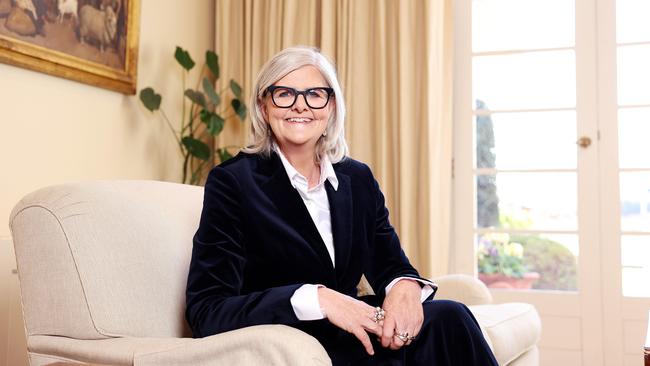
In her first interview, Governor-General Sam Mostyn responds to critics of her appointment and outlines how she will put her stamp on the role.
Sam Mostyn knows she doesn’t fit the typical mould for a governor-general.
Unlike many of those in the role before her, largely former politicians, judges or military leaders, Mostyn’s service to the nation has been of a different kind – on the board of charitable organisations, as an outspoken gender advocate, and a champion of inclusion in sport and in the corporate world.
Guided by a strong sense of duty, civic responsibility and fair play, the 59-year-old is unapologetically unafraid to take up space, if only to hold it open long enough for someone else to step into the spotlight.
A lawyer by trade, Mostyn’s resume paints a picture of an eminently qualified candidate, yet her appointment drew fierce criticism as detractors argued her past comments on gender, inclusion and Indigenous issues made her too “activist” for the apolitical role.
When Prime Minister Anthony Albanese asked her to become Australia’s next governor- general, and only the second woman to take on the role after Dame Quentin Bryce, it was not a request she took lightly.
“I had to think about why? Why would anyone say yes?” she says.
“I don’t think you just say yes without considering the impact that the role can have, and whether I actually had the skills and attributes to do it well.”
This serious internal contemplation of her suitability flies in the face of the commentary that immediately swirled around her appointment.
As the Prime Minister had already indicated his wish to appoint a woman to the role well before Mostyn’s name was associated with it, to many observers her career and qualifications were immediately placed behind her gender. The backlash was by no means a new phenomenon for Mostyn.
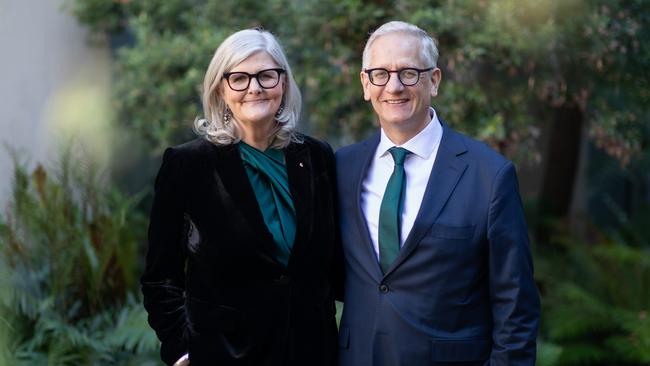
“Women who’ve been appointed through quotas, and I’ve been one of them many times, have long received enormous criticism,” she says.
With decades of experience in the corporate and not-for-profit sectors, political advising and a legal background, Mostyn disputes the assertion her appointment as governor-general lacked merit. But it’s an accusation she’s prepared to tackle head on.
“When that complaint is aimed at me or any other person who’s been the beneficiary of that kind of appointment, you have to point out that those processes do often have more scrutiny, more examination of your ability and your background than any other appointments that were made prior,” she says.
An early lesson she’s had to learn again coming into the role of governor-general, is not allow yourself to be “confused or deterred by the criticism when you start”.
“Some of that criticism is coming from quarters that really do want to make you feel diminished and don’t want you to succeed,” she says.
“It’s better to step into the job, do the job, and in every action, bring others along and remain resilient and optimistic and focused about the job at hand.”
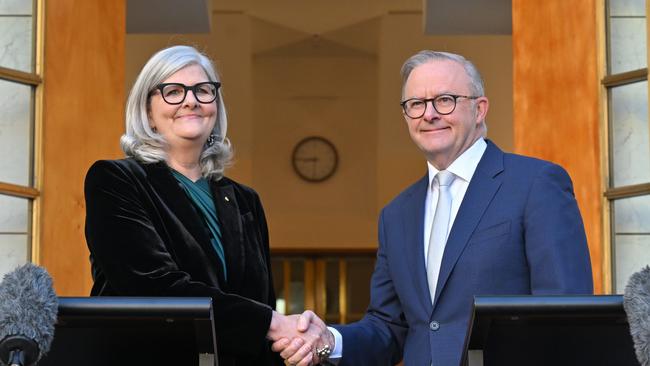
When Albanese appointed Mostyn, he gave her three guiding principles: be “visible, modern and optimistic”.
In response, Mostyn has crafted a five-year plan to put “care and kindness, belonging and inclusion” at the centre of Australia’s progress. To her, this means caring for each other, institutions, community, mindful civil debate and democracy.
“Care wasn’t just a soft option in the way it might often be misconstrued, it’s about absolutely fierce determination to talk about, what does care mean in the hands of the future of Australia,” she says.
Mostyn may be younger than her predecessors, but her views on bringing “modernity” to the role mean making it inclusive of the nation’s history from Indigenous culture, to the British institutions and traditions that followed, and the vibrant multiculturalism of modern Australia.
In the months leading up to her swearing-in on July 1 this year, Mostyn sought advice from each of the living former governors-general. She says they all had “unique perspectives” on the role but were unanimous in urging her to “always be authentically myself”.
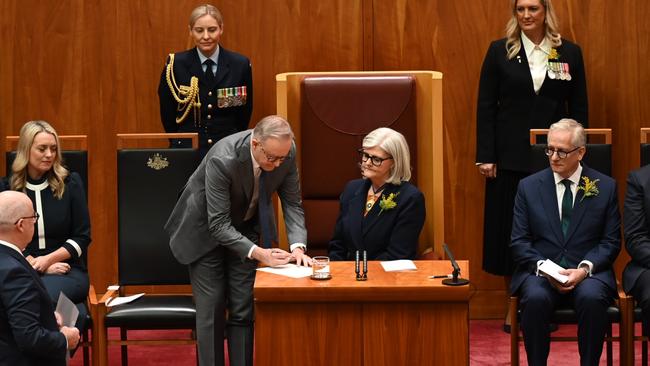
Several advised her to be present in communities after the first rally of response to disasters had subsided.
“To wait and then show up in communities that have had really tough times and just sit and listen and convey messages back to government and ministers in a quiet way,” she says.
As Mostyn made clear in her maiden speech, she is deeply conscious of the challenges facing Australians.
“I’ve been thinking about the intersection of mental health and natural disasters, the cost-of-living crisis and domestic and family violence,” she says.
Asked about his choice, Albanese says the role of governor-general is “ultimately one of service to the Australian people”.
“Sam Mostyn’s entire life has been one of service,” he says.
“Her Excellency’s leadership reflects our enduring Australian values of equality, fairness and a responsibility to build a better future for the next generation.”

In October, King Charles III will visit Australia, a trip Mostyn can offer some insight into having shared an almost hour-long audience with the monarch at Buckingham Palace shortly before her own swearing-in.
“We had a wonderful conversation,” she says.
“I’m looking forward to him visiting.”
Mostyn says the King has a “huge regard” for Australia, and wants to celebrate the best of Australia where he can.
“He wants to see modern Australia, engage with communities broadly though within a tight time frame, given his health,” she says.
“He’s committed enough time to see the best he can of our scientific community, our charity communities, and the work that’s been conducted under the King’s Trust.”
Mostyn says the King was a “very kind man” who was “deeply invested in the success of Australia in our own right”.
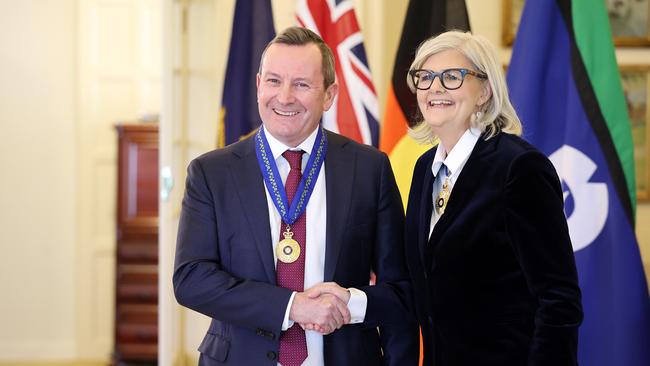
In a few short months, Mostyn has begun to put her stamp on role.
At an investiture ceremony held in Government House overlooking Canberra’s Lake Burley Griffin, great care was taken in acknowledging the nation’s devoted leaders, best and brightest thinkers and bravest citizens honoured with awards.
At a moving service, recipients included former West Australian premier Mark McGowan, a posthumous recognition of Labor figure, the late Simon Crean, and renowned cancer researcher Professor Karen Canfell. Particular care was taken to support grieving mother Kim Dorsett, who attended to accept a posthumous bravery award on behalf of her son Luke, who died saving his niece during the fatal Dreamworld theme park tragedy in 2016.
Mostyn says she is “conscious of the history” of the office, but wants the ceremonies done in a way that is “open and welcoming” that Australians feel “comfortable with”.
No award recipient left without a one-on-one conversation with the GG, and a photo, with Mostyn the obliging subject of dozens of selfies. Walking around the historic house after guests departed, Mostyn was eager to share her plans for the space.
More than 25,000 Australian school students visit the house each year, and it is with these children in mind that Mostyn wants the bookshelves in her formal office filled with local authors. Consultations have also begun with the National Gallery to install a wider array of artworks.
The current decor in Government House tends toward paying homage to the building’s roots as the site of a former sheep station, a history Mostyn wants to acknowledge while also ensuring visitors can see a broader version of their Australia represented within.

Diversity and inclusion have long been core guiding principles for Mostyn, who possesses an innate courage in her convictions and personal drive she heavily attributes to her upbringing.
“I think we’re all products of our family,” she says.
The eldest of four sisters (Alex, Suzanne and Sally), she says this instilled a “fairly typical” type of “good kid syndrome” where taking care of others was a priority.
“My sister always said I was born 30, so that means I was always a bit serious, and always put my hand up to do things,” she says.
From primary school captain, to being on the student council at high school, growing up Mostyn says she was “always wanting to see how we could change things for the better”.
“I don’t know if this is innate, or just something that was encouraged in our family a lot, but I’ve always felt like if I utilise my voice and my logic and communicate things well, then it was right to deploy that to help improve things,” she says.
The family moved several times during the military career of her father, army colonel William “Bill” Mostyn, 90, she started primary school in Adelaide while her father was in the Vietnam War and lived in Melbourne for a time but most of her early years, the rest of primary school and high school were in Canberra.
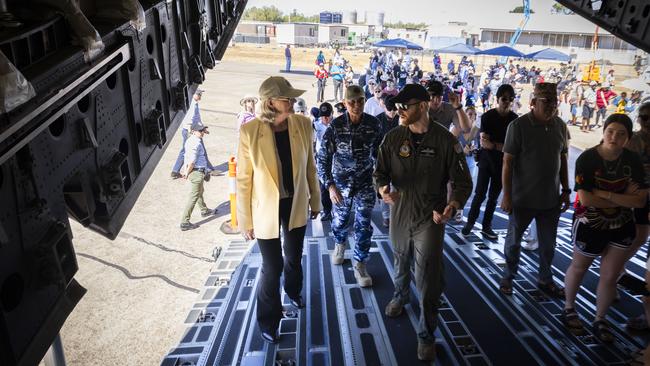
But it’s the sacrifices of her late mother, Jenny, who dedicated her post-marriage life to care for the family that sticks with Mostyn.
“She sacrificed the skills and knowledge she attained at university to raise us, and to make sure that we were a happy family,” she says.
One of her sisters has an intellectual disability, which also spawned the family’s lifelong association with the disability community.
Mostyn says hers was a “big volunteering family” with the kids routinely found doorknocking for charitable causes like the Heart Foundation or Salvation Army.
What she describes as her parents’ “deep sense of ethics, honesty and regard for others” set her in good stead for a future perpetually in proximity to power.
“Our parents raised us with a good strong sense of authority and respect for authority, but not to be overborne by it,” she says.
From prime ministerial offices, to corporate boardrooms and now even the royal palace, Mostyn says she has never felt frightened or overwhelmed by those in positions of authority.
“I have learned a lot along the way of how power and policy is administered,” she says.
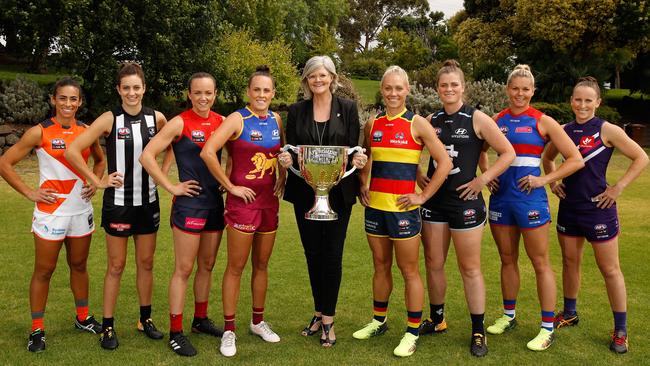
After completing an arts/law degree at the Australian National University, Mostyn worked as an associate to Justice Michael Kirby in the NSW Court of Appeal.
She later became an adviser to Prime Minister Paul Keating and represented him on the organising committee for the Sydney Olympics.
She went on to serve on boards and in senior roles across a wide range of companies from Virgin Australia and Citibank Australia to charitable organisations such as Beyond Blue, Reconciliation Australia and the Climate Council.
A sports lover as a child and a devoted Sydney Swans fan, she is perhaps most widely known for becoming the first woman to serve on the AFL Commission, where she became a driving force behind the push to create a national women’s competition.

Mostyn’s appointment to the commission in 2005 attracted much of the same criticism from anti-affirmative action naysayers as her rise to governor-general some 20 years later.
But the public debate about quotas and targets and the “merits” of the women who fill the roles is not one she has ever resiled from.
“I’ve always fought against the binary notion of quotas versus merit,” she says. In the case of the commission role, she was among 10 women headhunted as candidates who were then vetted over the course of several interviews.
“I hadn’t just been tested about my capability to govern the game and bring common sense and strategic mind to the role, we were also tested on our understanding of the rules of the game,” Mostyn says.
“Because, goodness me, you wouldn’t accept that the women putting their hands up would have that already.”
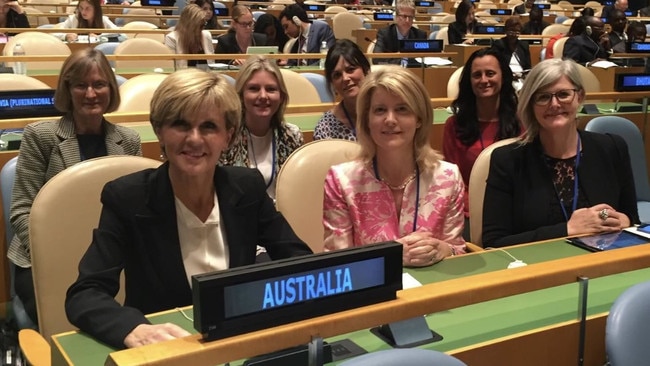
She says this level of scrutiny is “generally what happens when a quota appointment is made” and yet the first response is often to diminish the experience or credentials of the candidate because they “weren’t compared to men”.
“I’ve said this over many years: hoping, wishing and praying for women’s equality in leadership, or anyone’s equality in any part of any sector of the economy, it just doesn’t work, and saying it’ll happen naturally, it doesn’t work,” she says.
“The barriers are unconscious, so they stop that elevation even if there aren’t deliberate decisions made by good people.”
Mostyn says it’s often “good men”, among whom she counts then-AFL Commissioner Ron Evans, who know what is missing around the table and then put in place the process to fix it.
“Ron Evans knew we can’t keep governing a game that has 50 per cent women as the support base and have no women in our governance structure,” she says.
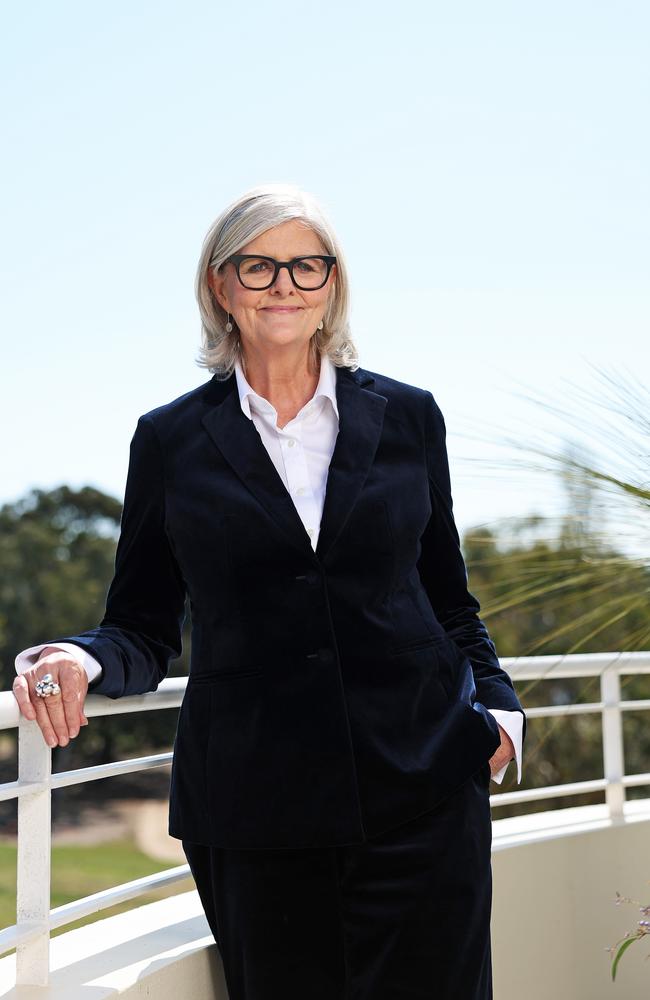
“I took the criticism that I hadn’t been compared to men who might have wanted to apply – well, they weren’t looking for a man, they wanted a woman to start to deliberately, purposefully address something that kept women out.”
Mostyn’s appointment to the commission was the first of several tipping points within the sport that ultimately led to the creation of the AFLW, a national competition that in seven years has become a beacon of sporting prowess for female athletes.
Mostyn was a key driver in establishing the national women’s competition – she travelled the country consulting with players and coaxed key AFL officials into seeing the girls had the very same passion and love of the game as the men.
Yet by the time the first AFLW season kicked off in 2017, she had just left the commission – though this was no coincidence.
“I’ve learned as I’ve got older that it was my job back then, opening those doors for other women or other people who’ve been left out, to create the spaces and then to move on when it was time for me to leave,” she says.
“To make sure others filled those spaces on their terms.”
Mostyn is not ignorant of the privileges her life has afforded her, but rather than merely capitalise on those advantages, she set out to use her opportunities to lift others.
“Once I got into those roles, I felt that then it was my job to open the door for others,” she says.
“Women, and anyone who’s been ever left out, must be around those tables of influence, and particularly tables of power and where we’re designing things for the future.”
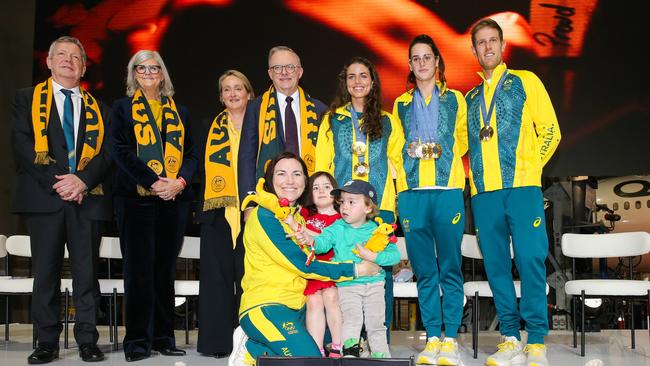
As eager for role models as she is to offer her own mentoring services, Mostyn says she is always looking for examples of leadership that embody “empathy, respect, some charisma, clear language, clear intent and full accountability”.
Her first overseas trip as Governor-General – to Paris for the Paralympic Games – came at the suggestion of one of her “great guides, friend and mentor” 13-time Paralympic medallist Kurt Fearnley.
The pair previously served together on the board of Australian Volunteers International, and Mostyn credits Fearnley with deepening her understanding of belonging and inclusion.
“Kurt has … guided me along the way in all of my senior roles around when we talk about belonging and inclusion, what does that actually mean?” she says. “It’s not just a statement in an HR policy, it’s not just highlighting certain people you recruit, but what would a fundamental change to belonging in all of our workplaces, all of our sectors, look like.”
Mostyn says she drew on Fearnley’s advice in taking on the role of governor-general.
“I had long conversations with him, and Kurt’s point was ‘show up for the Paralympics’,” she says. Weeks after her swearing-in, Mostyn was at Admiralty House in Sydney presenting Paralympic Opening Ceremony flag bearers, track and field star Madison de Rozario and swimmer Brenden Hall, with their flags.

By chance, it was then Mostyn who put the bronze medal around de Rozario’s neck after her stunning run in the Women’s 5000m T54 final.
“The International Paralympic Committee just happened to have chosen that event for me to present,” she says.
Mostyn says watching the Paralympians “captivate the nation” was a powerful experience.
“Sitting in the stands and watching absolutely full capacity stadia full of people engage not just in the winner, but the stories, about overcoming adversity, it’s that this is a moment that could remind us about what does true inclusion look like,” she says.
Fearnley says he knew Mostyn would “relish” being involved with the Australian Paralympians. “They adopted her straight away, and she adopted them,” he says. “Her first event at Admiralty House, the Paralympic flag bearers announcement, the first international trip, attending the Paralympic Games. And she didn’t just stand by the side and shake hands, she buried herself into our movement.”
Fearnley says he has “benefited enormously” from having Mostyn in his life, and believes her “ability to bring people together will ultimately benefit us all”.
“Sam brings people together and helps lead them in a direction they may not be sure of at first, but ultimately many benefit from,” he says.
“Her role in helping get the AFLW up and running is a tangible example and there are many more.”
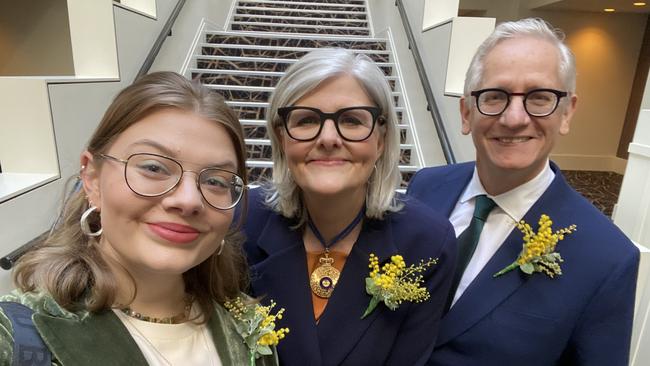
Mostyn herself had a “huge sporting interest as a kid,” and strongly advocates for people to get involved in a social athletic endeavour.
“I think team sports teach you how to win well, they also teach you how to lose well,” she says. “You learn what it’s like have a team dynamic and sweat and get into something together.”
She describes herself as “pretty resilient”, drawing strength from those around her.
She says in husband Simeon Beckett, a barrister and human rights law expert, she married the “person that would always stand by me”.
Along with her daughter Lotte, 24, an actor and writer, Mostyn says she is “blessed with the most extraordinary support family-wise”.
“That and the people I’ve worked alongside and worked for, I just keep learning from.’’

Add your comment to this story
To join the conversation, please log in. Don't have an account? Register
Join the conversation, you are commenting as Logout
‘Hardly a bargain’: Would you pay $42 for a plate of cabbage?
Dark Shepherd has broken new ground as Brisbane’s only lamb-focused restaurant, where diners can feast on everything from pastitsio bites to $190 lamb and lobster.
Aussie star’s snub: ‘I’m still not important enough’
Kate Miller-Heidke and husband Keir Nuttall reveal how they fell in love, ahead of her Logies nomination.